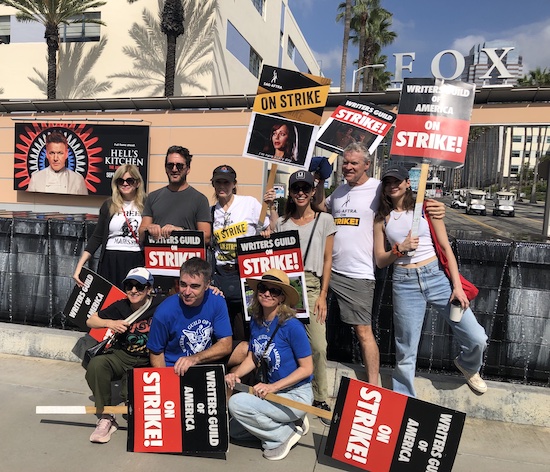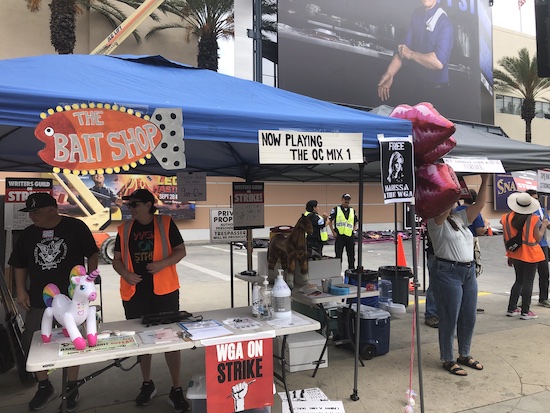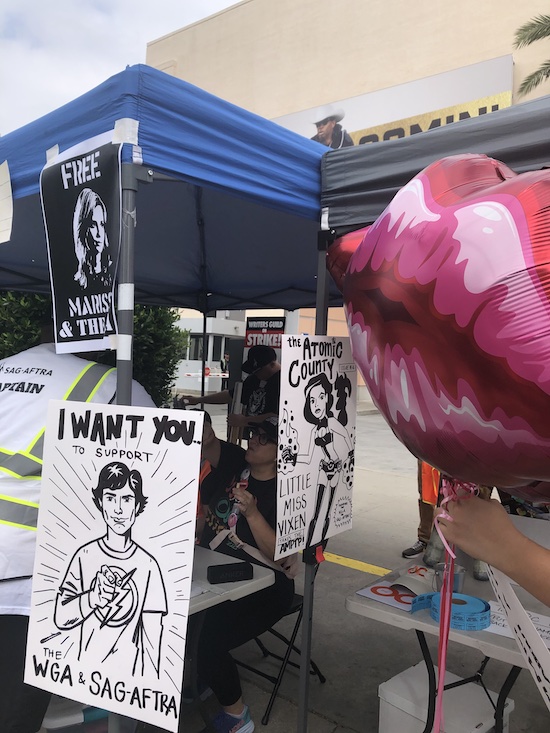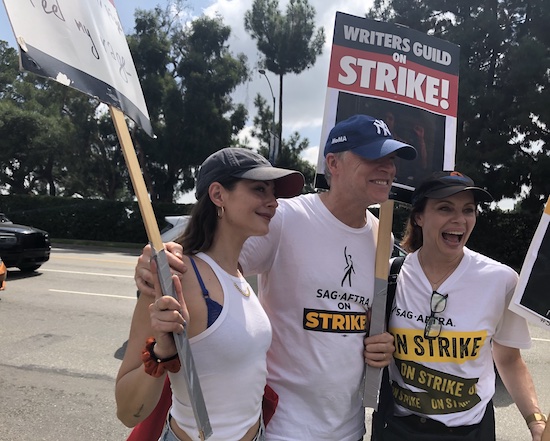THE OC Team Reunites to Support the Ongoing WGA and SAG-AFTRA Strikes
September 7, 2023 by Marisa Roffman

THE OC cast and creative team. (Photo credit: Marisa Roffman/Give Me My Remote.)
A little over two decades after THE OC debuted on Fox (on August 5, 2003), the cast and creative team reunited at the lot where it all started for an important cause: a show of support amidst the ongoing WGA and SAG-AFTRA strikes.
“We’re here in front of Fox, where we all auditioned to get [our] roles,” Tate Donovan, who played Jimmy Cooper, tells Give Me My Remote. “So it’s kind of hilarious that we’re all meeting up again to strike. But it’s a great combination of seeing old friends and remembering all the great work we got to do with each other, and how lucky we were. And also trying to make a statement that, hey, future generations might not be able to have this moment: where you feel as though you’re paid decently [alongside] groups of writers and cast members that are working together to make something that lasts generations.”

Photo credit: Marisa Roffman/Give Me My Remote.
The picketing check-in area went all-in on the theme, complete with blow-up versions of Seth’s Captain Oats and Summer’s Princess Sparkle, a Bait Shop sign, a raffle for show swag, signs paying tribute to an iconic Seth quote (“Acknowledge me now, or lose me forever.”), artwork in the style of the show’s Atomic County comic book, as well as a Free Marissa & the WGA sign. (And, naturally, music from the show’s soundtracks.)
“It’s important to show solidarity for the guild, obviously, any time you can—and the fact that they organized this OC picket, I felt how could you not come for that?” THE OC creator Josh Schwartz says. “And it’s been nice to get some of our writers and cast members here.”
The teen drama ran for four seasons on Fox, producing 92 episodes…including a jaw-dropping 27-episode first season.
“The business has changed in such profound ways,” Schwartz says. “[Producing partner] Stephanie [Savage] and I like to joke, we arrived right at the moment where we can still smell the fumes of the old business—there was still a little bit of that going around.”
“Obviously, the first season of THE OC, we did 27 episodes, which would be like three seasons of a streaming show now,” he continues. “[The new model of] short orders, the longer time between seasons, the three seasons and out of most shows now; a lot of it just creates more instability for writers. We all used to—in the middle of the 22, 25-episode season—love that idea; that eight-episode season sounded so great. But there’s an economic reality to that. And, obviously, we’re all grappling with the changes to the business now.”

Photo credit: Marisa Roffman/Give Me My Remote.
As shows’ seasons shrank, it also led to smaller rooms and less experience for writers who might go on to create their own series. Leila Gerstein, who wrote on seasons 3 and 4 of THE OC (and went on to create HART OF DIXIE and SAINT X), calls her time in a writers’ room “the most important learning experience of my life.”
“It taught me story. It taught me how to break story,” she says. “It taught me how to collaborate, and taught me to take care of my ego. I relied on my writers’ rooms for both shows I created; they were essential to me. And I have loved being on a writing staff. I think that is one of the great creative joys. We will fight to keep them.”
“I’ve been doing this for a while now and I’ve seen the decline in pay, and the decline in lifestyle,” she continues. “And I’m really sad and nervous for the next generation who’s coming behind us, who are living job-to-job. When we were starting in network TV, if you reached a certain level you know, ‘I have job security. I think it’s time for me to buy a house. I can have a family and settle down, because I have comfort in that I have a future career.’ When we made 22 episodes of television, it was a year of work, particularly if you’re lucky enough to be on an ongoing series. And [new writers] don’t have that at all.”
It’s also been made more complicated by shows having wild success on secondary streaming platforms. (Schwartz co-created, co-developed, and/or executive produced a number of The CW shows—including GOSSIP GIRL—which found a new audience on Netflix.)
“Look, for writers and actors, for the most part, if you’re a staff writer on a show, if you’re an actor, the way the deals have been structured is that you really don’t participate,” he says. “There’s some money; it’s not the same as it used to be by any means. I don’t know how we put that toothpaste back in the tube, but it’s something that needs to be reckoned with, because it’s just profoundly changed the kind of the lifeblood of the business for so many people.”
“It’s sad, because people dream about these jobs, want these jobs,” Gerstein adds. “They grow up hoping that one day they can be lucky and talented enough to have these jobs. And to get here, and be treated terribly and misused and taken advantage of, it’s really demoralizing. It has been for me as well. So I come from a perspective when it didn’t used to be this bad. It used to be an exhausting job, but at least it was dependable income. And now it’s just an exhausting job.”

A Cooper family reunion with Willa Holland, Tate Donovan, and Melinda Clarke. The reunion marked the first time Donovan and Holland met, despite playing father-daughter on the drama. (Photo credit: Marisa Roffman/Give Me My Remote.)
For the actors, the streaming boom has been a double-edged sword. “There’s been great changes—really wonderful changes, the content has gotten better and better and better, and it’s gotten more and more diversified,” Donovan notes. “The stories that we’re telling now are the best it’s ever been. But in terms of money, I earn way less now than when I did THE OC or when I started my career. Most careers you think, ‘Oh, as you get older, you earn more money, you’ve got seniority.’ But it is just the opposite.”
“You get on a streaming show and it’s fantastic content and you feel so lucky to be involved with all these amazing people,” he continues. “But it’s like, ‘Wow, okay, I gotta figure out what I’m gonna do financially.’ And it’s not like I live some sort of crazy, wealthy life—I’ve got a kid in college and I’m like, ‘Holy s—, how am I gonna pay for this?’” (Donovan also notes residuals are essential post-success, because actors frequently get typecast, which limits their options for present-day income.)
“I think I’ve been a member of SAG since 1988, and this is my first time on a picket line,” Melinda Clarke, who played Julie Cooper, adds. “It’s interesting—technology always surpasses our contracts, and this is a long time coming. We’re not just dealing with the legacy companies anymore, we’re dealing with the tech companies. And we’re not trying to stay in the past, we’re definitely progressing into the future, but it feels that they don’t want partnerships…or at least that’s the message I’m feeling: that they don’t want to be in partnership with artists, it feels like we’re just simply hired employees and we’re replaceable.”
“And I wouldn’t be here if the writers of this fabulous show hadn’t given me the dialogue—such a memorable dialogue—that I had the honor of saying,” she continues. “And 20 years later, we’re celebrating that show. Without the actual particular talented artistry of those writers collaborating with us actors, it’s lightning in a bottle. And it should be supported in a partnership—or at least, made to feel that way.”
That lack of partnership has been a difficult change for the actors and writers to adjust to. “It’s hard to feel like a piece of commodity and not like an actual human to these people,” Willa Holland, who played Kaitlyn Cooper in seasons 3 and 4, says. “I mean, it’s almost as if they’re not acting human. They’re acting like computers, and they’re just thinking analytically with data and not actually thinking with the heart. And it hurts to feel that. But it’s a wake-up call. It’s a wake-up call for every other industry. We all expected AI to disrupt industries; we knew that was happening. But I don’t think anyone expected this to be the first industry disrupted. Maybe that it would be the second or the third, but definitely not the first one that would cause this intense ripple effect. We’re kind of setting the tone for every other industry and what’s to come and it’s scary.”
With the WGA’s strike well into its fourth month and SAG-AFTRA’s about to conclude its second, Schwartz acknowledges his concern right now is about the lack of movement. (The AMPTP has not responded to the WGA’s last counteroffer.)
“Is anybody talking right now? Are the two sides talking? Because obviously writers and actors are the most publicly impacted, but everyone is impacted right, all the way down the line,” he says. “Everybody on any crew, all the sort of ancillary businesses that depend on production; everybody’s being devastated right now. And I just really hope that we can figure out a way to get these talks going and get this resolved, because so many people beyond just writers and actors are being impacted.”
With the actors’ negotiations—the AMPTP has not met with SAG-AFTRA since the strike was called in July—”I think it is a whole umbrella; I don’t think you can speak to one [issue],” Holland says. “I think focusing on one thing will take away from the importance of the other subjects…which is a scary place to be, where we don’t actually have the option of picking and highlighting one or two or three areas. We must highlight every single one because it’s a detriment to our actual life.”
“It’s wild, there’s so many things I’m experiencing at 54 where it feels we’re regressing,” Clarke says. “If you think back to the 1930s, when there were something like 22,000 strikes going on…It’s an American thing for unions [to exist]. And it’s not just SAG and AFTRA…You’re talking about an entire industry being shut down right now, because these companies—not producers—are beholden to shareholders’ profit and growth instead of the small piece of a budget they could [give up].”

Josh Schwartz with his picket sign. The creator also snapped photos of fans’ homemade signs. (Photo credit: Marisa Roffman/Give Me My Remote.)
But the team did at least embrace the silver lining of their reunion, which also included Autumn Reeser, Savage, and writers like Melissa Rosenberg. “THE OC was my second-ever job,” Gerstein says. “These are still my dearest friends. I actually just spent the weekend with [writer] J.J. [Philbin]. We got so close. We grew up on that show, three of the five of us got married; we all lived on the same street. This is my family. It’s so fun to be here.”
Schwartz, who walked the line with a “Welcome to the Picket, bitch” sign paying homage to Luke’s unceremonious welcoming to Ryan in the show’s first episode, marveled at the creativity of the picket. “You know, it’s the 20th anniversary of the show,” he says. “We have an oral history [book] coming out in the fall. The fact that 20 years later, people still remember the show, want to talk about the show, want to strike while carrying signs for the show, is just tremendously gratifying. And I just feel really honored to be here.”
RELATED:
- The SUPERNATURAL Team Reunites for ‘the Most Epic’ Reunion Supporting the WGA and SAG-AFTRA Strikes
- Tracy Spiridakos and Jesse Lee Soffer Explain the Importance of Striking: ‘It’s a Watershed Moment’
- WGA, SAG-AFTRA, and More Picket on Behalf of Support Staff: ‘They Really Are the Heart and Soul of a Writing Staff’
- Danny Pino Explains the Importance of Residuals for the Striking Actors and Writers
- The GLEE Cast and Creative Team Reunite to Support the WGA and SAG-AFTRA Strikes: ‘We’re At a Turning Point in Our Industry’
- WGAW Latinx Writers and SAG-AFTRA National Latino Committee Unite for an Inspiring Picket: ‘Latinos Know How to Fight a Labor Fight’
- Sera Gamble Highlights the Importance of Writers’ Rooms
- Team SWAT Shows Their Support for the Ongoing WGA and SAG-AFTRA Strikes: ‘We’re Asking for Dignity and Respect’
- The ARROW Writers and Cast Reunite to Picket—and Raise Money for Charity—in Support of WGA and SAG-AFTRA
- SUPERNATURAL Vets Sebastian Roché, Ruth Connell, and Rob Benedict on the Ongoing Strikes: ‘It’s a Fight That We Are Going to Win’
- Day 100 of the WGA Strike: Rob Forman Explains the Stakes for Everyone
- The FAMILY GUY Team on the WGA and SAG-AFTRA Strikes: Sometimes It’s ‘the Only Way to Get Something Done’
- TTIE Leaders Explain the WGA Strike Stakes for Historically Excluded Writers
- The Teams Behind LAW & ORDER: ORGANIZED CRIME and FBI: MOST WANTED Explain Why They’re Supporting the WGA and SAG-AFTRA Strikes: ‘It Is a Fight For Our Lives’
- THE X-FILES: David Duchovny and Rob Bowman on the Importance of the WGA and SAG-AFTRA Strikes
- The BONES Team Reunites to Support the Ongoing WGA Strike
Follow @GiveMeMyRemote and @marisaroffman on Twitter for the latest TV news. Connect with other TV fans on GIVE ME MY REMOTE’s official Facebook page or our Instagram.
And be the first to see our exclusive videos by subscribing to our YouTube channel.
As an Amazon Associate we earn from qualifying purchases made through links/ads placed on the site.
Related Posts
Comments Off on THE OC Team Reunites to Support the Ongoing WGA and SAG-AFTRA Strikes



Comments